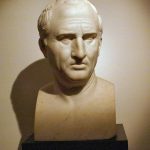In 43 BCE Cicero was on the list of proscribed (outlaws), arranged by triumvirs: Antony, Octavian and Lepidus. The greatest supporter of the death of the speaker was Antony, who hated him. On December 7, 43 BCE Cicero died in his villa in Formianum. The murder of Cicero caused a great stir.
Cicero was one of the most intensely and persistently prosecuted politicians. Most of the Romans, however, did not give information to the authorities about Cicero’s whereabouts when he left Rome. Honestly saying, people sympathized him. Cicero, however, failed to avoid destiny forever.
On December 7, 43 BCE in his villa in Formianum, soldiers of Antony came. This is how the moment described Plutarch:
But meantime his assassins came to the villa, Herennius a centurion, and Popillius a tribune, who had once been prosecuted for parricide and defended by Cicero; and they had helpers. After they had broken in the door, which they found closed, Cicero was not to be seen, and the inmates said they knew not where he was. Then, we are told, a youth who had been liberally educated by Cicero, and who was a freedman of Cicero’s brother Quintus, Philologus by name, told the tribune that the litter was being carried through the wooded and shady walks towards the sea. The tribune, accordingly, taking a few helpers with him, ran round towards the exit, but Herennius hastened on the run through the walks, and Cicero, perceiving him, ordered the servants to set the litter down where they were. Then he himself, clasping his chin with his left hand, as was his wont, looked steadfastly at his slayers, his head all squalid and unkempt, and his face wasted with anxiety, so that most of those that stood by covered their faces while Herennius was slaying him. For he stretched his neck forth from the litter and was slain, being then in his sixty-fourth year.
– Plutarch, Cicero, 48
Other writers gave slightly different details of Cicero’s last moments. Livy, Appian and Valerius Maximus mention Gaius Popilius Lenas as the murderer, and Cassius Dio wrote about the piercing of the Cicero tongue with a pin by Fulvia, wife of Antony. Livy claimed that the faithful slaves were ready to defend him, but Cicero, having seen a mighty man, ordered the litter to stand on the ground and, leaning his head calmly, he gave it under the blow of the executioner.
From Cicero’s body, at the command of Antony, the hands and head were cut off and taken to Rome. There, they were nailed to the rostra on the Forum Romanum, from which he spoke so often.







